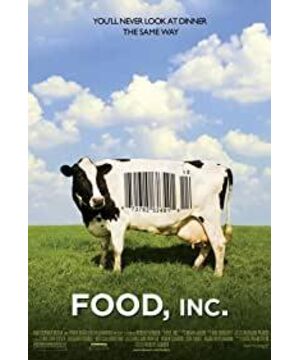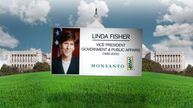1. What does "Food Company" tell? 1. Analysis of the current situation People take food as their priority. Living in modern times, we often feel the convenience and richness of food. But has anyone thought or asked, "What is the food we eat? How are they produced? Are the raw materials safe? What kind of problems does the food industry have?" In other words, the highly developed industrial society , bringing the explosive abundance of the food market, but few people pay attention to the food safety behind it. The film "Food Company" starts from the fast food industry and gradually expands to the planting industry, animal husbandry, and breeding industry, revealing that the operators of large food companies are willing to change the growth patterns and growth cycles of animals and plants in order to obtain high profits. Collusion with interest groups, defrauding the protection of policies, squeezing low-level laborers, "consuming" ignorant consumers, and "hegemonic monopoly" in the field of food production are undoubtedly a typical "risk society". 2. What is the problem 2. 1 The problem of food itself In the field of animal husbandry, the film focuses on the raising of chickens and cattle. Chickens are kept for half the time of 50 years ago, but the weight is twice as long, but their bones and internal organs cannot keep up with this growth rate, so they develop physiologically deformed, resulting in high mortality; At the same time, food companies use breeding and genetic engineering to make the chicken breasts preferred by consumers grow larger; the feed of the chickens is mixed with antibiotics, which makes the bacteria in the human body resistant to antibiotics and thus ineffective against antibiotics. The cattle's feed was changed from grass to corn, a change that reduces feed costs and allows cattle to grow faster. However, some studies have shown that continuous corn feeding increases the acid-fast Escherichia coli of the common bacteria. While the harm is powerful, certain mutations will occur, resulting in "0157-H7 Escherichia coli". The spread of new strains; at the same time, cattle are raised all day long in pastures where the manure is knee-high, and when they are sent to slaughter, the manure sticks to their skin, and the slaughtering company that pursues the speed of slaughter cannot guarantee that the beef product does not stick to it. feces, so the possibility of meat being feces is extremely high. To make matters worse, E. coli such as these are found not only in beef, but also in by-products from factory farms such as pineapples, apples, and vegetables. In fact, cows were able to excrete 80 percent of Escherichia coli by simply taking a 5-day break from corn feeding and switching to grass. But the food giant is not solving the problem from the production system, but seeking technological improvements (sterilization) so that corn farming can continue to exist. In the field of farming, corn is an all-purpose raw material, and agricultural scientists are constantly transforming new foods by improving food methods, such as high-fructose corn syrup, which is found in 90% of foods in supermarkets. This in itself is no problem, it greatly enriches human food choices. However, based on humans' innate preference for the taste of sugar, these high-fructose and high-starch foods lead to a surge in insulin secreted by the body, and the human sugar metabolism system collapses. "In fact, 1/3 of Americans born after 2000 will have early symptoms of diabetes. In a minority of the population, the proportion is as high as 1/2"; at the same time, the cheapness of corn has become a direct cause of livestock breeding problems , which has been analyzed in detail above and will not be repeated here. 2. 2 Problems with the food production process First, the way food companies treat workers is inhumane. The company doesn’t care about the health and longevity of its employees, and even borrows some of the fast-food industry’s employment system—squeezing the workforce by cutting wages, banning unions, speeding up production, and making workers do one thing over and over again; workers in the film They deal with internal organs all day, come into contact with blood, feces, urine, their fingernails fall off their fingers and are easily injured; at the same time, because each employee only needs to do one thing, they are paid very low, substitute Sex is high, and it's easy to find someone else to replace these employees. Second, the deceptive attitude of food companies towards consumers (diners). In terms of consumers' right to know, the food industry has always used various excuses to deceive consumers. For example, the US Food and Drug Administration does not label cloned animal meat on the grounds that "the logo will cause unnecessary panic in consumers". , such as the food industry's refusal to publish the calorie data of fast food, refusal to disclose that there are trans fatty acids in food, meat companies refusing to label the system of origin, opposing the labeling system of genetically modified food, etc.; on the other hand, food marketing methods "Scams" are implied everywhere, such as on trademarks and packaging covers, falsifying the appearance of these products as "originating from natural farms" through idyllic images; in meat sales areas, the removal of bones is a deliberate attempt to disguise meat The source of the class. 2. Food Industry: Systemic Problems The food industry is a whole system, involving multiple stakeholders. In the film alone, it takes "monopoly" suppliers, namely large multinational food companies, as its core interests, and it reaches out to various government agencies. Departments, stores (including, for example, fast food restaurants and hypermarkets), other suppliers, farm laborers, consumers, and various food associations, food scientists, and law groups that are fully involved in interest groups. The government is not independent in the legislative part, the judiciary and the regulatory department. First, policies are controlled by interest groups. Such as the current corn subsidy policy, the reason is that large multinational companies lobby Congress with huge capital to make huge profits by using cheap corn to make food; second, the regulatory agencies are controlled by monopoly food companies, which directly leads to the incompetence of food regulatory agencies. For example, during the Bush administration, the United States Secretary of Agriculture has been the beef industry's leading lobbyist in Washington. In fact, not only regulators, but giant corporations have been sending people to lobby the legislatures with major decision-making powers. Other suppliers can be roughly divided into two categories in the film, weak and attacked. One category is anti-industrial food producers, which have been scrutinized by the government. The Ministry of Agriculture requested to suspend the business on the grounds of "unsanitary open environment", but the average colony formation index of the sample after research is far lower than that of industrially produced meat; the other type is the organic food production company, which has to be integrated into the modern agricultural system. Produced in a capitalist way, but it does affect the system in small and persistent ways. The farmers in this film can be divided into two types: those that have been controlled and those that have not been controlled for the time being. On the one hand, food factories control farmers through contracts. For example, the way that food companies defraud chicken farmers for continuous investment, that is, after the initial investment, the company will threaten to terminate the agreement to require periodic technical transformation and purchase of equipment, forcing chicken farmers to build up debts, lose any right to their own business, and become "slaves". "On the other hand, after obtaining the patent rights for the seeds, the company began to prohibit farmers from keeping the seeds, and supplemented with investigators, hotline reporting telephones and other measures, completely making farmers have no production rights. As for uncontrolled farmers, food factories have also taken steps. First, the disappearance of public seeds. At the same time as the disappearance of public institutions for breeding and strain improvement work, large multinational corporations such as Monsanto Corporation own the intellectual property rights of most of the food products in the United States, making farmers have to choose seeds under the company's patent; second, the definition of seed infringement. The cultivation of traditional soybeans will inevitably be exposed to the "contamination" of genetically modified soybeans, which will be defined as patent infringement, and farmers, as victims, need to prove their innocence. illegal acts; third, blacklists and the "threat" of the judicial system. Large companies will blacklist farmers who challenge the authority, and give them different degrees of punishment from refusing to sell patented seeds, fines, and prosecution. Labor can also be divided into the bottom laborers of the country and illegal immigrants. The current situation of the lower-level laborers in the country has been analyzed in the previous section, and will not be repeated here. Illegal immigration is entirely in the hands of the food giants, at the bottom of the system. First, illegal immigrants have no social status in this country, let alone rights; second, the government colludes with the interests of giants. At first, the government acquiesced to the recruitment of illegal workers by meat suppliers. After the anti-immigration movement emerged, the Immigration Bureau took strict measures to escort illegal workers, but they did not touch the managers who were involved. Third, illegal immigrants are not only food factories Active recruitment, even the origin of illegal immigration is directly related to such giants. For example, since the establishment of the North American Free Trade Area, Mexico has become a dumping ground for cheap corn in the United States, which has caused more than 1.5 million Mexicans to lose their jobs and become a "hidden danger" for illegal immigration. At the same time, food giants use capital to win over associations, law groups and agricultural scientists to form closed internal interest groups. Such as the Meat and Poultry Industry Association sued the Ministry of Agriculture "without the power to order the plant to stop production", even if the plant failed multiple tests, the food has the possibility of contamination. Finally, consumers in the system are also "coerced" by food giants. First, the food giants, through lobbying by interest groups, make any criticism an illegal act. Laws such as the Vegetarian Defamation Act could send anyone questioning ground beef jail time, and several agricultural states have made it illegal to publish photographs of industrialized food production processes or livestock farms; become an almost impossible event. It is not difficult to see from the stakeholders of the system that the core stakeholders of the food system dominate the power of the system. In addition, the food market within the system is also unhealthy. First, the absolute monopoly of the food market. The four largest food companies occupy 80% of the market share of the food supply system of fast food chains, and the same monopoly is also in various fields of food such as large supermarkets and meat markets; second, the vicious expansion of large food companies. Large food companies have expanded by acquiring small companies in many emerging fields. Such methods allow these leaders to penetrate various potential food fields in a sprint manner and achieve sustainable monopoly; third, the global dumping of the food industry. U.S. dumps cheap grain everywhere, leaving unsubsidized farmers Unable to compete with it, facing unemployment. Second, the industrialization of food production has also been criticized. First, in the highly commercialized food industry, animals and plants lose their dignity. The analysis of animal husbandry in the previous article is detailed, and I will not repeat it here; secondly, the production of food loses its natural aesthetics. Planting and raising are essentially alienated into production; third, the development of technology brings greater risks. Technologies such as the increasing use of technology in food production have resulted in an excellent environment for the infection and spread of harmful microorganisms. To sum up, although food safety is a very serious problem involving the whole industry chain, it is only one of many problems. Even, food safety is not a problem, just a manifestation. The underlying problem is a food system problem. When we reflect on the internal operating mechanism of the system, it is not difficult to find the ultimate meaning of "capital". First, the core stakeholders, that is, food giants are the absolute owners of capital; second, food giants use capital to win over the powerful and intellectuals to form interest alliances; third, food giants use capital advantages to "rule" the disadvantaged, including farmers. Labor, other suppliers, etc.; Third, the ultimate and only purpose that food giants pursue in the food system is capital. Thus, capital is the crux of the system. Furthermore, the problem of this system is only a manifestation, a manifestation of the collective problems of this society, such as in the film "I think, if a civilized society only regards a pig as a pile of lifeless meat...others coexist Civilizations of all nations will adopt the same attitude, i.e. disrespectful and trying to control everything”. In other words, it's a question of modernization. Therefore, the risk society is introduced for in-depth analysis. 2. Risk society 1. Postmodernism: Deconstructivism Postmodernism is deconstruction, and again, according to Risk Society, implying an unnamed "transcendence," implying what is named, while denying what still exists between it and the familiar. connect. In other words, this is essentially the relationship between outdated theories and habitual ways of thinking, which also makes modernization possible to become reflective modernization. The modernity of the society we live in is different from the modernity of the 19th and 20th centuries. The current modernization is fully developed modernization, so the two sides of modernization are also fully exposed, and modernity is no longer a fairy tale. However, postmodernism, reflective modernization, systematically criticizes modern society, and generally has the following characteristics: language symbolization, information fragmentation, cultural entertainment, production distance, and moral busyness. Combined with the film "We now make independent agricultural production decisions in the hands of others, and let the board of directors of a food company in a big city thousands of miles away. Control the decision-making power, and those who make the decisions do not need to face the consequences of these decisions." It turns out that if the sense of distance in this production is eliminated, there will be a new way of thinking for the answer to the system problem. 2. "Capital": The Operation of Capitalist Society In Risk Society, a critique of the functional premise of capitalism and the inevitability of modernity. First, in a developed industrial society, modernity is endowed with extremely high ideals. A thoroughly modern society is the pinnacle of modernity, and it makes no sense to even imagine a possible new transcendence; secondly, there is also no other modernity that is coming, the classical theorists of industrial society or industrial capitalism. , has transformed historical experience into inevitability, into hidden a priori. Capital is the driving force behind capitalist society, and the uniqueness of capitalist society in modern society makes the pursuit of capital a reasonable and necessary behavior. This book proposes, "allowing ideas to run through our new modernity in a new way", which I think can be partly read as a reflexive pursuit of capital, respect for life, protection of the environment, instinct for food Love, any discussion of human nature will make it possible to solve the problems of the food system and make it possible to heal the crux of this society. 3. Risk society theory defines risk society as "a stage of social development that may bring destructive losses to human existence due to reflexive modernization and globalization" according to the demonstration of "Risk Society". Among them, reflexive modernization and globalization are the direct reasons for the formation of risk society. According to the definition of risk, reflexive modernization makes modern people's cognition of social risks more profound. Globalization directly creates risks, but also magnifies the risks of modernization. The loss of life is the essence of risk in modern society. In modern times, the risk is more of a "humanized" risk, that is, with the breakthrough of technology in modernization, the risk structure has changed to be dominated by the uncertainty of people. The manifestations of modern risk are technological risk and institutionalized risk. Institutionalized risk is to some extent a by-product of "humanized" risk. However, the unscientific or failure of the system makes the institutionalization of risk into institutionalized risk. In particular, Baker emphasizes "responsibility" in institutionalized risk, arguing that this is the most important factor in the institution. In his view, liability is contained in the "principle of insurance" of simple modernity, which can no longer hold as responsibility for danger falls into the unpredictability of space, time and society. At the same time, due to "organized irresponsibility", modern social risks are in trouble. Combined with the film, based on this theory, the problems in the agricultural system can be reviewed again, and the following three enlightenments can be obtained. First, the core of the problem is the risk of "humanization". The agricultural system fully reflects the modern technology, from the system of food industrialization, high-efficiency technical production to the controllable scope of food safety. However, such as the "failure" of the agricultural system is the product of the artificial selection of interest groups, and the institutionalized risks of the organized and irresponsible giant enterprises are also caused by human beings; second, the invisible risks are also fatal risks, that is, the loss of life in the agricultural system . In the agricultural system, despite all kinds of "domination" and "deception," there is no risk, or the risk is hidden. Only when life is in crisis, the problem of the agricultural system is realized, so the risk is invisible, and the only possibility is the fatal risk; third, the risk of globalization: agricultural dumping. It is not difficult to find in the film that illegal immigration partly stems from US agricultural dumping, which is enough to see that the risks are magnified under the perspective of globalization. According to the argument of "Risk Society", the definition of risk society is "a stage of social development that may bring destructive losses to human existence due to reflective modernization and globalization". Among them, reflexive modernization and globalization are the direct reasons for the formation of risk society. According to the definition of risk, reflexive modernization makes modern people's cognition of social risks more profound. While globalization directly creates risks, it also magnifies the risks of modernization. The loss of life is the essence of risk in modern society. In modern times, the risk is more of a "humanized" risk, that is, with the breakthrough of technology in modernization, the risk structure has changed to be dominated by the uncertainty of people. The manifestations of modern risk are technological risk and institutionalized risk. Institutionalized risk is to some extent a by-product of "humanized" risk. However, the unscientific or failure of the system makes the institutionalization of risk into institutionalized risk. In particular, Baker emphasizes "responsibility" in institutionalized risk, arguing that this is the most important factor in the institution. In his view, liability is contained in the "principle of insurance" of simple modernity, which can no longer hold as responsibility for danger falls into the unpredictability of space, time and society. At the same time, due to "organized irresponsibility", modern social risks are in trouble. Combined with the film, based on this theory, the problems in the agricultural system can be reviewed again, and the following three enlightenments can be obtained. First, the core of the problem is the risk of "humanization". The agricultural system fully reflects the modern technology, from the system of food industrialization, high-efficiency technical production to the controllable scope of food safety. However, such as the "failure" of the agricultural system is the product of the artificial selection of interest groups, and the institutionalized risks of the organized and irresponsible giant enterprises are also caused by human beings; second, the invisible risks are also fatal risks, that is, the loss of life in the agricultural system . In the agricultural system, despite all kinds of "domination" and "deception," there is no risk, or the risk is hidden. Only when life is in crisis, the problem of the agricultural system is realized, so the risk is invisible, and the only possibility is the fatal risk; third, the risk of globalization: agricultural dumping. It is not difficult to find in the film that illegal immigration partly stems from US agricultural dumping, which is enough to see that the risks are magnified under the perspective of globalization. According to the argument of "Risk Society", the definition of risk society is "a stage of social development that may bring destructive losses to human existence due to reflective modernization and globalization". Among them, reflexive modernization and globalization are the direct reasons for the formation of risk society. According to the definition of risk, reflexive modernization makes modern people's cognition of social risks more profound. Globalization directly creates risks, but also magnifies the risks of modernization. The loss of life is the essence of risk in modern society. In modern times, the risk is more of a "humanized" risk, that is, with the breakthrough of technology in modernization, the risk structure has changed to be dominated by the uncertainty of people. The manifestations of modern risks are technical risks and institutional risks. In order to offset the uncertainty of human beings, various systems have been established in modern times to provide protection for human beings. However, the unscientific formulation of the system or the failure of the system makes the institutionalization of risk into a system. reduce risk. In particular, Baker emphasizes "responsibility" in institutionalized risk, arguing that this is the most important factor in the institution. In his view, liability is contained in the "principle of insurance" of simple modernity, which can no longer hold as responsibility for danger falls into the unpredictability of space, time and society. At the same time, due to "organized irresponsibility", modern social risks are in trouble. Combined with the film, based on this theory, the problems in the agricultural system can be reviewed again, and the following three enlightenments can be obtained. First, the core of the problem is the risk of "humanization". The agricultural system fully reflects the modern technology, from the system of food industrialization, high-efficiency technical production to the controllable scope of food safety. However, such as the "failure" of the agricultural system is the product of the artificial selection of interest groups, and the institutionalized risks of the organized and irresponsible giant enterprises are also caused by human beings; second, the invisible risks are also fatal risks, that is, the loss of life in the agricultural system . In the agricultural system, despite all kinds of "domination" and "deception," there is no risk, or the risk is hidden. Only when life is in crisis, the problem of the agricultural system is realized, so the risk is invisible, and the only possibility is the fatal risk; third, the risk of globalization: agricultural dumping. It is not difficult to find in the film that illegal immigration partly stems from US agricultural dumping, which is enough to see that the risks are magnified under the perspective of globalization. The institutionalized risk of corporate organized irresponsibility is also caused by human beings; second, the invisible risk is also a fatal risk, that is, the loss of life in the agricultural system. In the agricultural system, despite all kinds of "domination" and "deception," there is no risk, or the risk is hidden. Only when life is in crisis, the problem of the agricultural system is realized, so the risk is invisible, and the only possibility is the fatal risk; third, the risk of globalization: agricultural dumping. It is not difficult to find in the film that illegal immigration partly stems from US agricultural dumping, which is enough to see that the risks are magnified under the perspective of globalization. The institutionalized risk of corporate organized irresponsibility is also caused by human beings; second, the invisible risk is also a fatal risk, that is, the loss of life in the agricultural system. In the agricultural system, despite all kinds of "domination" and "deception," there is no risk, or the risk is hidden. Only when life is in crisis, the problem of the agricultural system is realized, so the risk is invisible, and the only possibility is the fatal risk; third, the risk of globalization: agricultural dumping. It is not difficult to find in the film that illegal immigration partly stems from US agricultural dumping, which is enough to see that the risks are magnified under the perspective of globalization.
View more about Food, Inc. reviews










